Courses Paid courses Dyslexia
Dyslexia
| Achieve a certificate |

It's estimated that up to 1 in every 10 people in the UK has some degree of dyslexia. Dyslexia is a common learning difficulty, which primarily affects the skills involved in accurate and fluent word reading and spelling. However, a child or young person can be affected by dyslexia in many ways. For instance, a learner may experience difficulties in writing (Dysgraphia) and maths (Dyscalculia), as a poor working memory can affect sequencing and mental calculation. They may find it difficult to quickly process verbal instructions or appear to be disorganised and lacking in concentration. It may also be harder for them to control their bodily movements (Dyspraxia). Dyslexia can be a confusing and disorientating condition that can negatively impact the learner’s self-esteem and confidence in learning.
This course aims to develop the knowledge, skills and practice of all education professionals working with children and young people (CYP) with dyslexia. You will learn how to assess the needs of a learner and go on to develop a support plan consisting of SMART goals and interventions, which you will implement and later review to determine how well it has met the learner’s specific developmental needs.
The course content relates to learners in compulsory education (4-18 years) and responds to the information needs of the whole community. Parents and carers benefit from raised awareness of their child’s needs. Advisory teachers, therapists and educational psychologists gain access to evidence-based CPD resources that can be used to strengthen capacity in their local authority and schools. Schools can use this course to train individuals or groups of teachers and teaching support staff as part of a school’s improvement plan or a whole-school initiative. NQTs/RQTs also build a secure knowledge of the graduated approach at the start of their career.
Course learning outcomes
On successful completion of the course, you will be able to:
- describe the relationship between phonological awareness and reading ability
- explain the role that working memory has in learning to read, write and spell
- examine the purpose and process of individual education assessments
- apply a graduated approach to assessment using a universal, targeted or intensive staged process
- use checklists to assess reading, comprehension, decoding and phonological awareness
- identify co-occurring difficulties
- provide strategies to teach decoding, spelling, comprehension, phonological awareness and reading fluency
- systematically monitor progress in response to intervention, and plan next steps
- evaluate how assistive technology can support student progress
- work in partnership with parents to create an action plan to practice and improve literacy skills
- create a support plan for a pupil/group of pupils in your school
Our courses are structured into four sections. Click on the section headings to reveal page titles and some example content.
Learn about the main characteristics, the role of working memory, the range of difficulties that learners may experience and the impact on other areas of functioning.
- Section objectives
- What is dyslexia?
-
Characteristics of dyslexia
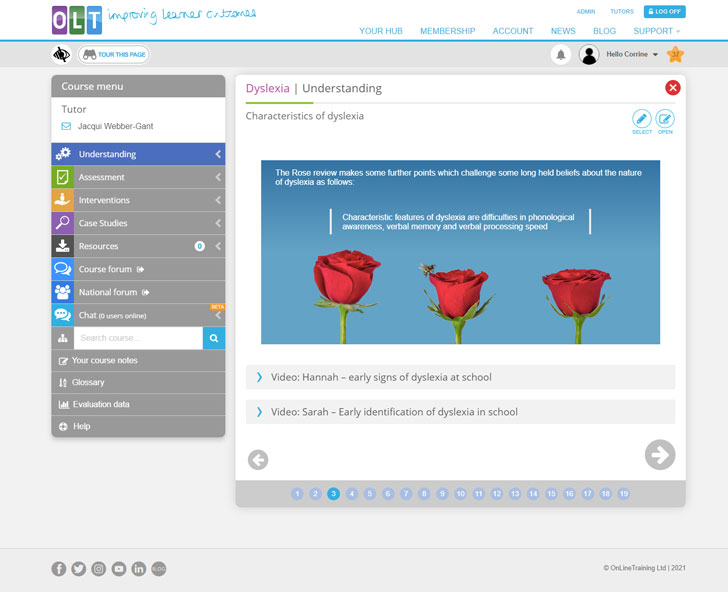
Screenshot from Understanding page 3 - Characteristic features: phonological awareness
- Characteristic features: verbal memory
- Characteristic features: verbal processing speed
-
Working memory and dyslexia
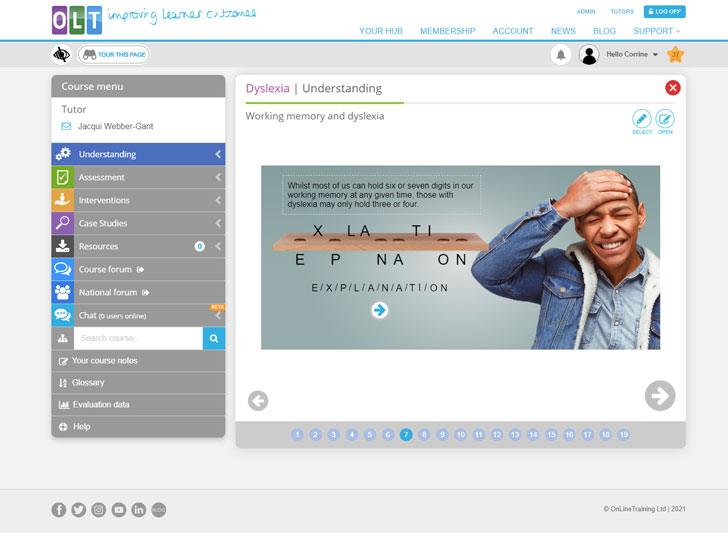
Screenshot from Understanding page 7 - Dyslexia and intelligence: Identify your skills
- The simple view of reading
- Dyslexia as a continuum
- Visual stress
- Dyslexia and other difficulties
- Response to intervention: Review your skills
- What causes dyslexia?
- The incidence of dyslexia
- The politics of dyslexia
- Perspectives on dyslexia (Catherine Brogan video)
- End of section quiz
- Section summary
Learn how to assess individual needs and carry out informal assessments of the main areas of potential difficulty.
- Section objectives and your learner profile
- What is assessment?
- Screening for dyslexia
- A graduated approach to assessment
- Monitoring progress
-
Skills assessment
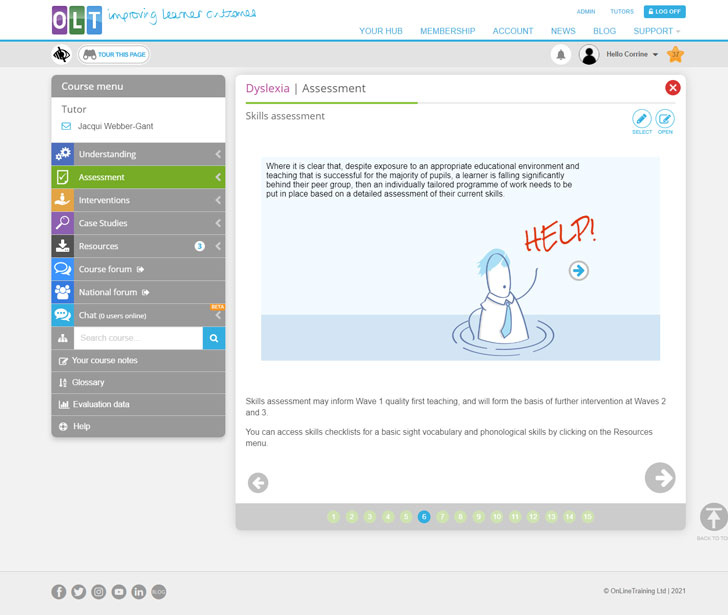
Screenshot from Assessment page 6 - Co-occurring difficulties
- Comprehensive assessment
-
Carrying out your own assessment
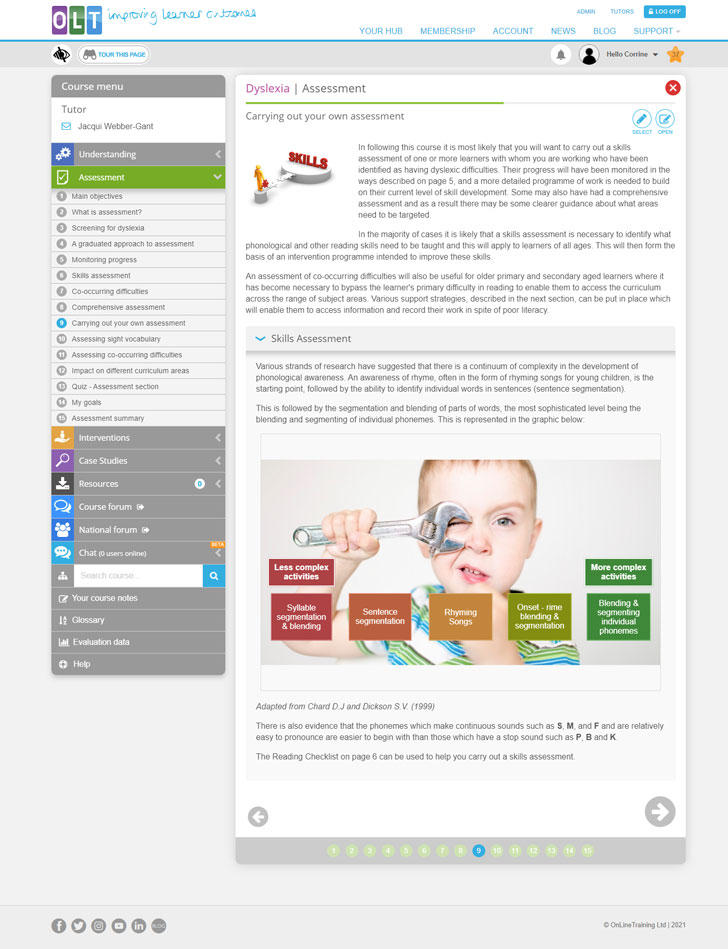
Screenshot from Assessment page 9 - Assessing sight vocabulary
- Assessing co-occurring difficulties
- Impact on different curriculum areas
- End of section quiz
- Course assignment: Your Learner’s three SMART Goals
- Section summary
Discover a range of strategies to help learners with dyslexia.
- Section objectives
- Issues related to intervention
- Principles of intervention founded in research
-
Multisensory teaching
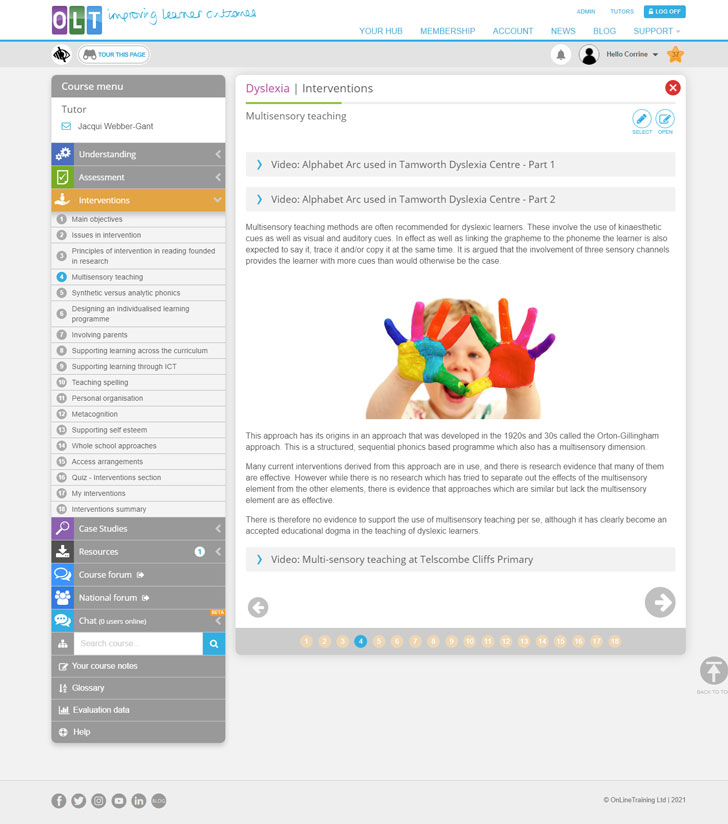
Screenshot from Interventions page 4 - Synthetic versus analytic phonics
- Designing and individualised learning programme
- Involving parents
- Supporting learning across the curriculum
- Supporting learning through ICT
- Teaching spelling
- Personal organisation
- Metacognition
-
Supporting self esteem
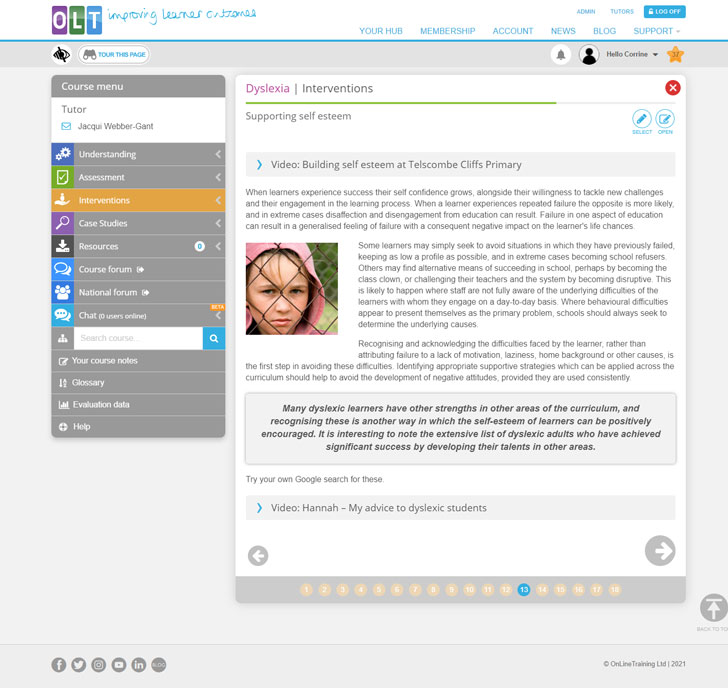
Screenshot from Interventions page 13 - Whole school approaches
- Access arrangements
- End of section quiz
- Course assignment: Your learner’s interventions
- Section summary
View real examples that illustrate the needs of the individual, the interventions implemented and their resulting progress.
- Case study: Harrison (Burton Centre)
- Case study: Tamworth Dyslexia Centre
- Case study: Belgrave High School – Staffordshire
- Case study: Meet Hannah and Sarah
There are many strategies and pieces of knowledge that I will take away from the course and apply to my role as SENCO
Senior Leader (14/07/2021)
The Dyslexia training has given me an in depth and better understanding of a recognised learning difference, and I feel that when it is used in practice with students showing sign of dyslexic tendencies, the outcome can be a positive one. Using the strategies and resources mentioned throughout the course, it gives a clear idea of the different ways a student can be supported, and achieve their potential despite having a learning difference
Teaching Assistant (07/07/2021)
This training has given me an in depth understanding of dyslexia as a learning difference and has helped me to be able to use the strategies and resources recommended within this course to support and benefit the pupils at risk of dyslexia that I work with. The outcomes are positive and the learners are gaining self-esteem and confidence, and are achieving their targets.
Teaching Assistant (07/07/2021)
My 'view' of Dyslexia has completely changed. I am keen to make changes in my school, along with the SENCo. and possibly obtain Dyslexia friendly school status at some point in the future.
Other Position (07/07/2021)
I thoroughly enjoyed the training. It did give me extra confidence in identifying the dyslexia traits and cater for our pupils' needs. I found the resources and the videos in particular very useful. It was great to hear the parents' and children's views. The tutors were very knowledgeable, helpful and friendly. They responded promptly to any question
Senior Leader (06/07/2021)
Firstly, would like to say thank you for this course. learning different strategies & good teaching practice to help in classroom for those children who have learning difficulties. Great knowledge!
Teaching Assistant (02/07/2021)
It has really made me think about how Dyslexia affects students - and where it is derived from (physically) - which enables me to make links now between seemingly disparate things (such as disorganisation and reading)
Senior Leader (29/06/2021)
I believe that this course and other from yourselves that are built for education can only benefit myself and the school and also play a pivotal part in helping any children that needs help, I think the course work was well thought out especially in the current climate knowing that you can still receive help via zoom or teams. I also now that any children can and will benefit from qualified staff being able to support them through their school time, I just wish that more help like testing was free so more children could be helped.
Teaching Assistant (29/06/2021)
Training has helped me focus on the main reasons for dyslexia and our choice and effectiveness of interventions. The use of mnemonics (for 2 Y6 pupils) in a regular 3x week intervention (1:1 ) have shown some improvements on their spelling results when recently assessed. They are not at age expected but have retained some spellings, one child is better at spotting an incorrect spelling and has learned the blends needed, but still struggles to retain the word in its entirety. Both these children have co-morbidity- ADHD diagnosed, one on medication, but without doubt their focus is frequently affected. I am constantly having to stress the frequency that the interventions need to be delivered i.e. at least 3x week in order for them to be successful; and include some independent time on the other 2 days for the children to practise e.g. over learn by playing a sound game; use Nessy or similar software, teachers like the speed of precision teaching (having assessed tricky word knowledge/first 100 HFW/statutory year group spelling lists or words commonly spelled wrong in their daily writing) and several children can be managed effectively over a week when teachers organise their adult support well. We are including this in Y1 to focus on the lowest spellers, we will be able to check in on their progress after phonic screening and evaluate who may need further assessment to check whether dyslexia is a likely concern
Other Position (22/06/2021)
This training has helped me understand the learning needs of some of the children I work with and has helped me tailor some of my interventions, especially with regard to instructions and managing their own goals and how to keep them motivated.
Qualified Teacher (07/06/2021)
The training has helped me review my current practices - to re-evaluate some of the interventions I currently deliver and add in some additional interventions. Thus, ensuring I am better able to adapt my approach and offer the best interventions to support each individual child's needs.
Teaching Assistant (07/06/2021)
It has given me a wider understanding of what Dyslexia is all about and just how much else it covers other than just reading and writing. I have picked up a lot of great ideas for interventions, tools, games and advice from other attendees to take forward into my workplace.
Qualified Teacher (28/05/2021)
I am now implementing some of the practical ideas given in this course on a day to day basis and these are not only benefitting the dyslexic boy in my class but also others who may need help processing information. This has been a great course.
Teaching Assistant (28/05/2021)
It has given me the ability to be able to assess pupils and give them the correct support. My tutor has been very supportive and helpful. Thank you.
Teaching Assistant (21/05/2021)
I definitely feel more positive in relation to supporting learners by setting smart goals and delivering interventions that will motivate, encourage and achieve progress.
Teaching Assistant (27/04/2021)
As SENCO I have a clearer understanding of the process I would like us to use to identify, assess and support learners at risk of Dyslexia. As several other members of staff from our school are also doing the training there will be benefits that we've had the same input and same points of reference. It will take a while before I can comment on how the training has impacted outcomes.
Senior Leader (09/04/2021)
I have a good understanding of strategies that will support the children in my whole class with good practise teaching skills.
Teaching Assistant (21/02/2021)
This course has enabled me to specifically consider how to support older children with dyslexia and looking at best practise. I was able to consider tools for personal organisation and working memory as this was not something I had previously fully understood as a difficulty linked to dyslexia. I have a clearer understanding of SMART targets and will be delivering some training in school for this. I hope and will encourage all teaching staff to enrol on this course!
Teaching Assistant (12/01/2021)
I feel I've the experience and knowledge to see when a child has dyslexic tendencies but this course has given me support and better understanding. I can see that I've been moving in the right direction but have a better idea of strategies and ideas to implement in the classroom.
Qualified Teacher (08/01/2021)
Toward the end of my training, I was able to implement but more importantly understand the meaning of Dyslexia and the struggles that a pupil may face whilst at school. Basic things like copying off a whiteboard or remembering a list of instructions to complete classwork. This understanding definitely helped me to support my student/students in one-to-one sessions as well as just recognizing the challenges that they would be facing in a larger class setting, which helped me to come alongside the student and support them in the way that they need. e.g repeating the instructions by simplifying them down to one at a time or writing it down for the student. I realized quickly that the principles learned could be used with any student in the class too. A simple thing like not being organized for the lesson with the right stationery or books was not always a fault of their own. I am really glad that I was able to do this course and I look forward to passing on the little knowledge that I have retained and encouraging the school to look into this more.
Teaching Assistant (07/01/2021)
This training has allowed me to understand and implement strategies that effectively support students with Dyslexia based on the needs of students with Dyslexia and their individual abilities. It has allowed space for understanding the effects of Dyslexia on students and how best to support them. It has given me clarity and specification on what Dyslexia is and has helped me to put together a learning programme suitable for these students that has achievable and realistic goals.
Teaching Assistant (04/01/2021)
The training has extended my knowledge and understanding on dyslexia further.
Qualified Teacher (03/01/2021)
The training has taught me about dyslexia and how it impacts on children's learning at school. For example, when supporting a student in French lessons, it became clear that he could not understand new words that were introduced. A strategy to help with this is to use a visual aid when learning new vocabulary, e.g. a picture of a glass of orange juice and the French word for this written below.
Teaching Assistant (02/01/2021)
| Rating |
| |
Delivery
|
| |
20 hours, 1-2 hrs per week |
| |
Flexible start date |
| |
Assignment
|
Licences
Your school or education system can purchase a licence to deliver our courses.
Contact us to find out moreCertification
20 hrs CPD Certified What's this?
Certificate of Achievement

